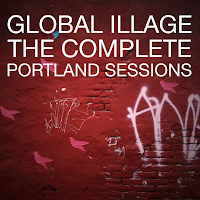Ralph Ellison and How the Self Floats
 |
| Still from the film "Ralph Ellison: An American Journey" |
It seems to me that Ralph Ellison may be this country's most important writer. Not so much for his production or even his style, but because of his deep wisdom and his remarkable understanding of the links between literature, politics, and our national struggle with the culture of identity. Every time I read essays like "Indivisible Man," "The Novel as a Function of American Democracy," or "Going to the Territory," I find a new perspective on life and am constantly amazed by the little jewels of truth that sparkle beneath the waters of Ellison's words.
The greatest influence on Ralph as a writer was Fyodor Dostoevsky. Invisible Man was Ellison's "Notes from the Underground." To me, Ralph Ellison did so much more than elevate Dostoevsky to the 20th century. He pointed at the universality of true human experience, that push and pull of soul, identity, culture, politics, and livelihood that goes on always just beyond our ability to understand and verbalize. We are inside ourselves, but we are also out there, floating in the world. This "floating" self is what is invisible. This floating self is where we are all one--connected, pure, blending, formally occurring. And he wasn't alone either.
At their best, all of this country's great writers provide us with a glimpse of our invisible selves, pointing at what is floating out there just in front of us like little puffs of breath on a winter's morning. Certainly Whitman, Emerson, and Thoreau up through Hemingway, T.S. Elliot, Pound, Fitzgerald, Faulkner, and Kerouac and Kesey understood the same thing that Ellison did. What makes Ellison so special, though, besides his extreme intellect and devotion to literature as the highest form of art, is the poignancy of the metaphor of the invisible man delivered through the alienated experience of the cast off intellectual (who just so happened to be black and wandered up from the rural south). But somehow, over the past twenty to thirty years, we have lost track of what Ralph Ellison and his colleagues were pointing at. It's as if there is a competition to do away with individuality. I see fear and hesitancy all around me. The object of life seems to be about being part of things. This is made all that much worse by TV and the media. Conform. Conform. Conform.
But the self is still out there floating, whether you like it or not. The only question is whether you want to take on the challenge of following it, or whether you wish to ignore what and who you are--do what you are told, ask no questions, bury your head in the sand.
I do not know if I have made sense of the experience my family and I went through trying to find my birthmother, Dana. But I do not think I would be able to write all of this down without the understanding of life that Ellison provides. The very notion of race in America is a wound in each individual psyche. No one is immune. Even those proud to be a certain color and physique bleed away a little bit every day.
However, there is no skin on the self, no body, no milk in the eyes. The self cannot be touched and it cannot be wounded. And yet, all would have it otherwise. It is so easy to slide into the protection of the body and live in the context of the body's particular place in the material world. Yes, it is hard to conceive of oneself as separate from one's body and place in the world--but that doesn't mean it's real.
We are all invisible, floating inside our bodies. When we love, we float into the world. When we read, we float into the world. When we sing and dance; when we laugh; when we walk in the woods; when we pray or meditate. This is our task and our purpose--to be floating in the world--yet so few really know this, so few are aware that they hover out in front of themselves sometimes. If you're invisible, how can you see yourself?
In the land of the blind, the one-eyed man finds it easy to hide.



Comments
Post a Comment